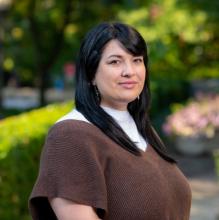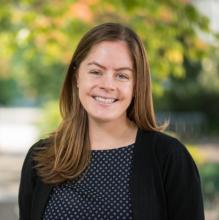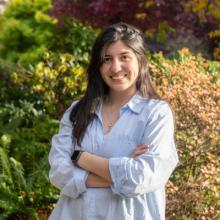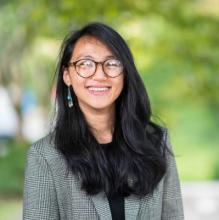Megha Kalia was a semi-finalist in the 2021 Three Minute Thesis competition, with her presentation, "Augmented Reality for Robot-Assisted Prostate Surgery." Her research aims to make Augmented Reality (AR) feasible for robot assisted surgery. In contrast to open surgery, robot-assisted surgery can decrease the patient recovery times from months to weeks.
Research Description
My research aims to make Augmented Reality (AR) feasible for robot assisted surgery. In robot assisted surgery a surgeon makes minimal precise incisions by reaching inside a patient’s body using miniature instruments and a camera mounted on robotic arms. The system while providing the same dexterity as human hands enables a precise and safe surgery leading to reduced recovery time from months to weeks in comparison to open surgery. However, like open surgery, the concerns of incomplete cancer removal remain; primarily because of unclear boundaries between healthy and cancerous regions in the camera image. The boundaries, although, are visible in medical imaging data such as Magnetic Resonance Imaging (MRI), constant juggling between the MRI and the camera image, while performing surgery, is impractical. Here, Augmented Reality can help by projecting information like tumor locations, retrieved from medical data like MRI, directly on top of the organ in real-time. Based on this, the surgeon can make the most optimum incision. However AR is not yet mainstream in robot assisted surgery because of the very low margin of errors needed and practical restrictions of safety and sterility in an operating theater. Simply put, my research is two-pronged: First part is to come up with the most accurate and real-time algorithms that need no external equipment during surgery to superimpose the tumours detected through MRI (for example) directly on the surgical camera view. The second part of my research relates more with the manner in which we display the tumour in the camera. More precisely, we need to find the balance of what is the best way of showing the tumour in the surgical camera view so that it does not create visual clutter and block the surgeon's view itself of where to make the incision.
What does being a Public Scholar mean to you?
Being a public scholar to me means to disseminate the knowledge about the current state of my research to the general public and clinicians in simple, understandable language. I believe, as a public scholar, it is my responsibility to bring researchers, like myself, clinicians and the general public on the same table and engage in broader discussions. Direct interactions will also motivate young diverse minds to pursue a career in health technology research.
In what ways do you think the PhD experience can be re-imagined with the Public Scholars Initiative?
In the field of health technology, I see many self-motivated PhD students working on big questions that can affect human lives in unimaginable ways. Moreover, I see research itself as a collective effort where an entire research community is taking small steps towards a greater goal. Hence the statement, “Standing on the shoulders of the giants”. However, It’s ironic that so many PhD students feel isolated, unmotivated and go through a “midlife crisis” in the middle of their PhDs. PSI can help re-imagining the whole experience where the outcome of a PhD can be much more than just a 100 pages long PhD thesis. For me PSI can help engagement with end-users, such as clinicians, and establish partnerships to produce more meaningful and high quality research. The partnerships have allowed me to see my proposed methods in action where I don’t need to wait for years to validate their usefulness. PSI also allows and supports more cross-disciplinary research providing a test-bed to try out more creative and out -of the box ideas to solve the same old problems. PSI can also help provide a more profound PhD experience by creating a network of people striving to solve important engineering problems in the form of its many bright Public Scholars.
How do you envision connecting your PhD work with broader career possibilities?
I see my PhD as a problem solving exercise where we are trying to make Augmented Reality a part of routine robotic surgical procedures. While coming up with novel AR methods, in addition to the usefulness of the method, we constantly ask ourselves questions pertinent to translation to a real surgery, such as, “is it feasible during surgery?” or “how much time will it take to perform the method during surgery ?”. Thus, I often find myself delving into domains such as human computer interaction, computer vision, machine learning, among others. The implementation always happens on the da Vinci surgical robot in our lab, which requires the knowledge of software and hardware alike. In the last few years, my PhD has given me the breadth of skills that I couldn’t imagine in any other professional role or position. The skillset opens broad career possibilities for me.
How does your research engage with the larger community and social partners?
The heart of my research is to come up with methods to showcase and fuse medical data (such as MRI and Ultrasound) with surgical camera images, to see tumor margins and organ boundaries, while performing surgery, in robot-assisted surgery setup. We aim to deploy our system in real robot-assisted radical prostatectomy procedure at Vancouver General Hospital (VGH) within the next couple of years. To that end, I have been observing surgeries in the operation theater to understand the surgical procedures and surgical environment in which my proposed solutions will be used. Furthermore, one of our collaborators is a Urologist at Vancouver General Hospital (VGH), who routinely uses the da Vinci surgical robot for prostate cancer surgery. A part of my research is to receive regular feedback from him on my new proposed techniques in early stages of research to keep the proposed solutions relevant to surgery. Such one-to-one engagements with clinicians is essential but not sufficient to reach a wider community. Despite being useful, the transfer of surgical AR solutions to surgical theaters has occurred with glacial speed in the past. It is not just due to necessary demands of medical safety, but also because of fear among clinicians and the general public arising from a lack of familiarity with novel technologies. The root of this problem is that the outcome of a scholarly work, in the form of a research paper, is difficult to comprehend for non-researchers. Therefore, I have given more than 15 demos to the general public and undergraduate students to educate them about the state of surgical AR technology. I plan on delivering more public talks through various avenues, provided by PSI, about my research and the current status of surgical AR research, especially for prostate surgery.
Why did you decide to pursue a graduate degree?
The decision to pursue a graduate degree was easy for me. I received a scholarship to spend a semester in Technical University of Munich, Germany in a lab where I worked with a well established research group, who have pioneered a lot of work in Medical Augmented Reality. My visit there was a lot of fun as I was working on such a cool project with some of the most hardworking, smart, humble and fun people. On top of it, reading research papers about human cognition and how we can integrate it with Augmented Reality applications, blew my mind. At that time PhD seemed like an extension of the fun, all while travelling around the world.
Why did you choose to come to British Columbia and study at UBC?
During my stay in Munich, although things were great at work, navigating my way without knowing the German language was not easy for me. That’s why I wanted to pursue my degree in an English speaking country. Then I came to know about The Robotics and Control Lab at UBC. It is one of the very few labs in the world, where an ongoing clinical study is in place. What this means is that I don’t just get to do research like other PhDs, but get to test my methods on real data and in real robot-assisted surgeries at Vancouver General Hospital. I also actively collaborate with my colleagues at both the Technical University of Munich and UBC, thus my network also expanded. Hence, when the opportunity to pursue a PhD degree in my current lab, under the supervision of the best of supervisors and surgeons came my way, I grabbed it.
I believe, as a public scholar, it is my responsibility to bring researchers, like myself, clinicians and the general public on the same table and engage in broader discussions.




